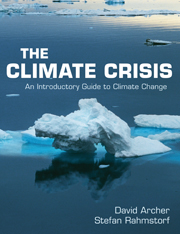Book contents
- Frontmatter
- Contents
- Preface
- 1 Retrospective: what we knew and when we knew it
- 2 Earth's energy budget
- 3 Climate change so far
- 4 Snow and ice
- 5 How the oceans are changing
- 6 The past is the key to the future
- 7 What the future holds
- 8 Impacts of climate change
- 9 Avoiding climate change
- 10 Climate policy
- Epilogue
- References
- Illustration credits
- Index
1 - Retrospective: what we knew and when we knew it
Published online by Cambridge University Press: 05 March 2013
- Frontmatter
- Contents
- Preface
- 1 Retrospective: what we knew and when we knew it
- 2 Earth's energy budget
- 3 Climate change so far
- 4 Snow and ice
- 5 How the oceans are changing
- 6 The past is the key to the future
- 7 What the future holds
- 8 Impacts of climate change
- 9 Avoiding climate change
- 10 Climate policy
- Epilogue
- References
- Illustration credits
- Index
Summary
The science of climate change has a long history, but progress has accelerated amazingly in the last few years. The theory of the greenhouse effect is almost two centuries old, discovered by mathematician Joseph Fourier in 1827. Later, in 1896, Svante Arrhenius estimated how sensitive the climate would be to changes in the concentration of the greenhouse gas carbon dioxide (CO2) in the atmosphere. Arrhenius' answer of 4 to 6 °C of warming from doubling CO2 was not far off from our current estimate of 2 to 4.5 °C.
Progress and contributions to climate change science have accelerated because science itself is growing exponentially, and also because of the importance of the topic to human well being and planning. Stanhill (2001) assessed the number of scientific papers on the topic of climate change, and found that the number of papers per year has been doubling every 11 years since the 1950s. He estimated that, globally, 3 billion US dollars were spent annually on climate change research as of about the year 2000. For scale, the net income of the Exxon Mobil Company was $40 billion in 2007.
The massive task of synthesis and summary of this exploding research effort falls to the Intergovernmental Panel on Climate Change, or IPCC. This organization was founded in 1988 by the World Meteorological Organization (WMO) and the United Nations Environment Programme (UNEP), and charged with assessing the scientific, technical, and socio-economic information relevant for understanding the risk of human-induced climate change.
- Type
- Chapter
- Information
- The Climate CrisisAn Introductory Guide to Climate Change, pp. 1 - 15Publisher: Cambridge University PressPrint publication year: 2009



